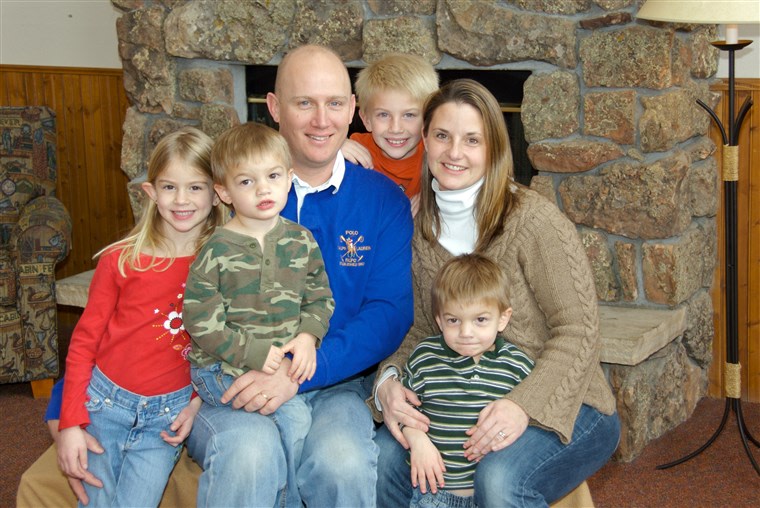When Ken Walsh returned from Iraq in October 2007, he had changed — and so had things at home.
He only knew life with his two older kids. He had been there for the birth of his youngest two, twins, during a two-week visit in his 15 month-service, but he had no relationship with them.
He found it difficult to truly bond with his family. There was a disconnect between the loving husband and fun father he wanted to be and his struggle with patience and expressing joy because of lingering postwar anger issues.
“To be in a violent atmosphere for that long, and then with helpless creatures you should nurture — a lot of people grasp at straws at how to do that,” Ken, 41, explained.
Now, more than four years later, Ken and his wife, Kara, are on solid ground — and they credit a retreat, arranged and funded by the nonprofit Project Sanctuary, with getting their marriage back on track.
“I knew we needed to connect in a non-stressful environment,” recalled Kara, who got the idea when she saw a newspaper ad for a retreat for military families in the Rocky Mountains.

“This retreat really helped bond us. We didn’t have to plan anything. There was barely any stress. When we got to the cabin, there was no TV. We were forced to just kind of be with each other,” said Kara, 38. “My husband could just relax and let the kids play on him — and it was a time where he didn’t have to think about anything. It was the first time since he was back that he was able to do that.”
Trend of divorce
When the war in Iraq officially ended in December, 40,000 troops returned home to their families. Since then, their spouses have had to work toward overcoming the strains of distance and the lasting effects of war to find a new normal.
For many, the stress on their marriage is just too much to bear. In December, the Pentagon reported that the military divorce rate has risen steadily since 2001, from 2.6 percent to 3.7 in 2011 — meaning that nearly 30,000 military marriages ended last year alone. In comparison, the civilian rate, which was 4 percent in 2001, fell to 3.5 percent in 2009, according to the latest data by the Centers for Disease Control and Prevention.
Retreats are an effort to reverse this trend. Organizations around the country are making it their mission to offer military couples and families places to have fun, bond and prepare for life on the home front through classes and counseling. These retreats are provided by nonprofits such as Project Sanctuary, Project New Hope, Coming Home Project, Operation Purple, Operation Oasis and the Army’s Strong Bonds.
While no numbers are available on how many marriages have been saved through these retreats, anecdotal evidence suggests that they are beneficial. Tammy Hagins, a counselor for Project Sanctuary who works with soldiers regularly, says the retreats empower service members.
“They’re getting the tools for marriage, their financial situation and communicating with their spouses. They’re connecting and reengaging,” she said. “The family is going to struggle more, but it’s a space to connect, to function as a family for a week.”
Reunited military families often face changing roles, getting reacquainted, intimacy issues, traumatic brain injury and post-traumatic stress disorder, explained Michael Schindler, author of the book “Operation Military Family: How Military Couples are Fighting to Preserve Their Marriages.”
“Now they have to blend commands. It can take six to 12 months before they get into some normal groove again,” Schindler said, adding, “There are a lot of the same pressures as normal couples, but added pressures of war.”
Bringing families together
Jennifer Matthews believes that attending a retreat helped alleviate some of this pressure in her relationship.
She met and fell in love with her husband Chase after he returned from his service with both legs amputated. The nonprofit Home for Our Troops built the Matthews an accessible home and funded a Project Sanctuary retreat. The Matthews, from Eddyville, Ky., thought it would be good for their daughter to be around other military children after schoolmates teased her about her father’s disability.
The retreat also brought the couple hope. While there, they saw another veteran who was amputated from the hip down ride a horse for the first time since his injury. “It was awesome,” said Jennifer. “To see his reaction: shock, surprise, happy, sad, overwhelming — just the look on his face....”
The end result was a boost in confidence, as well as a connection to other families going through the same struggle.
But retreats can't provide happy endings for all.
Kayt Sukel often relied on her husband, an Army commander, as her social outlet when they first moved to Germany. But when he deployed to Iraq, they barely talked. Sukel then went on a solo mission, pursuing her own friends and career as a travel writer and reaching decisions alone.
When her husband returned from deployment, they tried to go on a retreat but were stuck on a long waitlist. They argued constantly and ended up divorcing despite attending counseling.
“With lack of time and lack of focus, you end up in these separate orbits and there are fewer things that bring you together,” said Sukel, whose divorce inspired her book “Dirty Minds: How Our Brains Influence Love, Sex and Relationships.”
Still, for Ken and Kara Walsh, a retreat made all the difference. Now they are looking forward to celebrating their favorite holiday as a way to reflect on the bumpy road they’ve traveled. “Valentine's Day is a holiday for Kara and I to recharge our marriage, and reflect on the time we are able to spend with one another,” Ken said.
The Walshes are finding a new normal since his service. He’s less sensitive about first-world conundrums, like getting the wrong drink at Starbucks, and more protective of his family. But, he says, making the relationship work is an ongoing mission.
“In some ways, we’re stronger. I try not to look at the world as this, but you have enemies and allies,” Ken said.
“My greatest ally is my wife. It strengthened my connection and loyalty to her.”
Need resources and tips for reconnecting with loved ones in the military? Click here.
